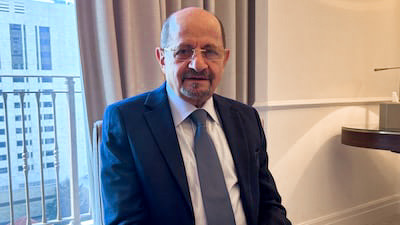His Excellency Dr. Shaya Zindani, Minister of Foreign Affairs and Expatriates, conducted an interview with “The National” newspaper during his participation in the Third Yemen International Forum in Amman. In the interview, His Excellency addressed the ongoing challenges in Yemen, emphasizing the lack of a clear vision for peace due to the Houthi militias’ refusal to engage in political solutions. He reiterated the government’s commitment to achieving peace and stability, calling for enhanced international support to address the humanitarian and economic crises in Yemen.
The following are the details of the interview:
There is still “no vision for peace” in Yemen while the Houthis are supported by Iran, despite its proxies weakening in Lebanon and its diminished role in Syria, Yemen’s Foreign Minister told The National.
Shaya Zindani said Iran keeps a grip on Yemen that it will not let go of easily. The Houthis benefited from Iranian intelligence, know-how, and training to maintain power in the country’s north, where most of the country’s population is based.
“Iran will only give up support for the Houthis if it is absolutely forced to,” Mr Zindani said, speaking on the sidelines of the Yemen International Forum in the Jordanian capital Amman on Monday.
Analysts agree that Yemen and the Houthi presence there is of strategic importance to Iran.
In recent years, the Houthis have been able to strike oil facilities in Saudi Arabia, shipping vessels in the UAE, and launched attacks against Israel in the past months.
But just before Hamas’s attack on Israel on October 7, 2023, the Houthis were inching closer to a peace agreement, brokered by Riyadh, to end the years-long war in Yemen.
The Yemeni government was not party to the deal, which all but fell through when the Houthis began attacking ships on the Red Sea in solidarity with the Palestinian people and in objection to Israel’s bombardment of Gaza.
Even though the guns have largely fallen silent in Yemen since a truce was agreed in April 2022 and ended in October that same year, Mr Zindani said he considers Yemen to still be in a state of war.
“Yes, there’s a ceasefire and the military activities have largely waned but we don’t see an end to the war any time soon. There isn’t a vision that allows us to say that peace is at the door,” he said.
Mr Zindani said with every passing day, civilians continue to suffer from the consequences of war. But by forging better ties with regional neighbours, the Foreign Ministry hopes to better serve national interests.
“Our work is going well and our relationships are improving day-by-day,” he said, adding that there is a limit to how much can be achieved.
“The government is currently occupied with providing a realistic and acceptable level of services for people – such as in health and education … But the priorities change under the circumstances of war.”
Most of the government institutions and agencies based in Houthi-controlled Sanaa, had moved to the de facto capital Aden, where the internationally recognised government is based.
However, Mr Zindani said more work needs to be done.
“When talking about state institutions, we don’t refer to them in their proper, scientific way. Many of them are still being formed … and aren’t working with their full potential and capabilities,” he said.
Corruption
One of the biggest issues facing the current government and the eight-member Presidential Leadership Council (PLC) headed by President Rashad Al Alimi, is corruption, Mr Zindani said.
Last month, the PLC revealed investigations into large-scale financial government corruption cases including embezzlement, mishandling of public funds and money laundering.
“There is a culture of corruption, not just a phenomenon,” Mr Zindani said.
“In my estimation, corruption is one of the most important things that prevents the state and government from working.”
As a result, the Foreign Ministry is rebuilding its structure, he said.
“Measures and procedures will be taken to reduce the number of workers in missions abroad to rationalise expenses and reduce the burdens on the government,” he said, bringing its “diplomatic capacity” back to Aden.
Many at the conference, including officials who are represented by members of the PLC, had called for a change in the leadership structure in Yemen in the form of a president and one, or two deputies, since coming to an agreement between eight people has caused the PLC to fail to achieve many of its objectives since its creation three years ago.
“There is a conflict of powers … and shortcomings in the interrelationships between the various bodies of power. There are complexities in decision-making by the authorities,” Mr Al Zindani said.
But despite the deep frustration with the current leadership, whether Yemen is going to see a new ruling system soon remains to be seen.
 Ministry of Foreign Affairs and Expatriates Official Web Site
Ministry of Foreign Affairs and Expatriates Official Web Site

